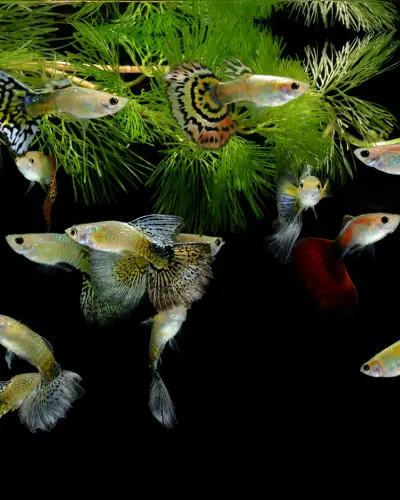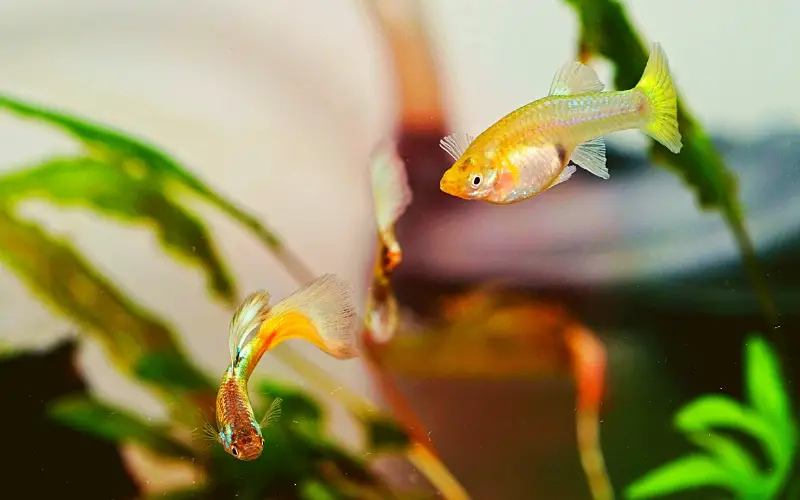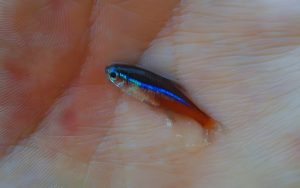Guppies, or “million fish” or rainbow fish, are brightly colored and easy to care for aquarium fishes in various sizes, colors, and types. But, Will different types of guppies breed together safely?
Guppy fish is native to South America and can be found in many natural and aquariums. If you’ve been curious about guppies and their breeding habits, this guide is for you!
Here we will explore some of the different types of guppies available and look into whether different kinds of guppies can breed with each other.

We’ll also discuss the best environment for successful breeding purposes to create an optimal living space should you keep these fascinating creatures in your home tank. Read on if you’re interested in learning more!
Table of Contents
ToggleWill Different Types of Guppies Breed?
Will Guppies Interbreed? Can different types of guppies breed together? Guppies are known for their ability to interbreed, meaning that two different kinds of guppies can produce healthy offspring.
Various types of guppies are capable of crossbreeding, including Endler and fancy guppies. Although, it should be noted that successful impregnation is not guaranteed.

This is why crossbreeding has become so popular among aquarium enthusiasts. By mating two different types of guppy together, it’s possible to create a hardier strain of guppy that can better withstand the rigors of life in captivity.
However, it’s important to note that not all types of guppies are suitable for crossbreeding. Some strains are more demanding and difficult to breed than others.
Suppose you’re planning on attempting interbreeding with your guppies. In that case, it’s best to research beforehand to determine which guppies are more likely to produce successful results.
What Types of Guppies Should I Use for Breeding?
The most popular types of guppy breeds for crossbreeding purposes are:
- The top swordtail strain.
- The bottom swordtail strain.
- The Spanish guppy strain.
- The platyfish strain.
These are all hardy breeds that will generally respond positively to interbreeding with other types of guppies. However, there is still some variation between individual guppies, so you may need to experiment before finding the right combination for selective breeding.
It’s also important to remember that guppies are livebearers and will produce many offspring if given the chance. As such, it’s best to ensure you have plenty of space in your tank or aquarium when attempting crossbreeding with these fish.
Guppy Reproductive Habits:
Guppies are prolific breeders and can produce multiple generations in a relatively short period. The average gestation period is around 28 days, although it may vary depending on the type of guppy you’re working with. Once the female fish is ready to give birth, she will begin to “drop” small fry.
This fry will remain hidden in the substrate of your breeding tank until they are large enough to swim away on their own. Guppy females can produce up to 200 fry at a time and may give birth as often as monthly.
Therefore, if you plan to breed different types of guppies, it’s important to have adequate space and resources available for the fry.
Livebearer Vs. Egg Layer:
Guppies are livebearers, meaning they give birth to live fry rather than laying eggs, as with egg-laying species. This can be advantageous if you’re attempting crossbreeding with guppies since the young will be more likely to survive and thrive in their environment.
In addition, livebearers tend to require less maintenance and are much easier to care for than egg-layers.
Because of their quick reproductive habits and hardy nature, guppies make ideal fish for aquarium enthusiasts who are just starting or need more experience maintaining an aquarium.
However, it’s important to remember that these fish can be tricky when it comes to breeding and require careful monitoring if you decide to keep them in your home tank.
When done correctly, crossbreeding guppies can result in a beautiful and hardier strain of guppy that will bring you many years of enjoyment!
What Is the Rarest Guppy Color?
The rarest guppy color is known as the Albino Guppy. This variety of guppy is characterized by a white-silver body with red eyes, making it a truly unique and stunning fish to behold.
The Albino Guppy is incredibly rare and can be difficult to find in the wild or through more traditional sources. However, they can sometimes be found at specialty aquarium stores specializing in exotic species.
If you want to add this rare and beautiful fish to your tank, it’s best to research extensively before purchasing and ensure that the seller is reputable and trustworthy.
Can You Breed Different Colour Guppies?
Can I breed different kinds of guppies? Yes, you can breed different colors of guppies. Crossbreeding different colors is a great way to create new and interesting variations in your tank.
However, it’s important to remember that the process can be tricky and requires careful monitoring.
To successfully breed two different guppies colors, you will need to ensure that the fish are of similar size and temperament.
It’s also important to observe the pair closely as they interact, as you want to ensure that they get along well before attempting breeding. If all goes well, you will soon have a beautiful breeding tank full of vibrant guppies!
How to Breed Different Colored Guppies?
How to breed guppies? Are you looking for a way to breed guppies with different colors and markings? Trying to figure out how to get the right combination can be intimidating.
You’ve spent time, money, and effort researching, buying supplies, and trying different tricks, but you still need to see the desired results.
Look no further! Our video tutorial shows you exactly how to achieve beautiful varieties of guppies. No more guesswork or frustration – follow the step-by-step instructions and watch your aquarium become a shimmering masterpiece!
Can You Mix Guppies with Other Fish Species?
Guppies are generally peaceful and easy to care for, making them a great addition to a varied community tank.
Not only are they aesthetically pleasing, but their lively behavior is sure to keep things interesting. However, it’s important to remember that guppies need room and hiding places to feel secure.
When deciding on compatible tankmates, you’ll want to choose peaceful species that won’t bully or outcompete the guppies for food.
Good candidates include other livebearers like mollies and platys, small peaceful cichlids and tetras, and peaceful invertebrates like shrimp or snails.
Research each species thoroughly before adding them to your tank, as there are always exceptions. By planning properly, you can create a beautiful and thriving community aquarium for you and your guppies!
Will Guppies Breed with Other Fish in the Tank?
Guppies will generally not crossbreed with other species in the tank. However, if two different livebearers species are present, they can breed and create hybrid offspring.
To avoid this, ensuring that all fish in the tank belong to the same species is important.
It is also important to research each species before adding them to the tank, as some fish may be more aggressive towards guppies than others. If you want to avoid any potential hybridization, it’s best to stick with one type of livebearer and create an all-guppy tank!
Will Different Guppy Species Fight?
Different guppy species will not necessarily fight with each other. However, it is important to remember that some fish may be more aggressive than others and could bully the weaker fish in the tank.
In a group of guppies, the smallest one is likely to be the target of aggressive behavior. If there is a significant size difference among the guppies, the larger ones may bully the smaller ones. Ensure that the size of your guppies is well-matched to prevent this behavior.
In general, keeping only one type of livebearer in the tank at a time is best to prevent any potential aggression. Suppose you want to keep multiple species of guppies. In that case, it is important to read up on each species’ individual personalities and behaviors before adding them to your tank.
By taking a bit of extra time to research and plan, you’ll be able to create a peaceful environment for all of your guppies and ensure everyone is happy and healthy!
Can All Guppies Breed Together?
Can all guppies go together? No. Different species of guppies can have different reproductive behaviors, and some may be incompatible with others.
It is also important to consider the size and temperament of each species before adding them together. If there is a significant difference in size or aggression levels, then it is likely that the larger or more aggressive guppies will bully the smaller, weaker ones.
To ensure that everyone is getting along and has the best chance of reproduction, keeping guppies of similar size and temperament together is always best.
Remember: When your female fish’s gravid spot grows bigger and seems heavier than before, female guppy indicates that she’s pregnant.
Can Fancy and Endler Guppies Breed?
Endler’s livebearers vs. guppy: Fancy and Endler guppies can be successfully crossbred. This is because both species belong to the Poecilia family and share a common ancestor.
Furthermore, their genetic makeup is very similar due to their classification as freshwater fish. As a result of this compatibility, successful mating between the two species has been observed multiple times in aquariums.
Can Fancy Guppies Breed with Regular Guppies?
Yes, Fancy Guppies can breed with Regular Guppies. This is because fancy guppy varieties originate from the same species as regular guppies, capable of producing viable offspring through interbreeding.
However, it should be noted that if you do interbreed fancy guppies with regular guppies without considering the color genetics of both lines, you may have a lot of ‘mixed’ fry that don’t display any desirable traits and might not even look attractive.
Therefore, if you want to breed Fancy Guppy and common Guppy successfully, it’s important to understand the genetics involved to ensure high-quality results.
Can Feeder Guppies Breed with Fancy Guppies?
Yes, feeder guppies can breed with fancy guppies. However, there are a few things to consider before doing so.
First, it is important to note that the offspring of these two guppies may not be ideal for breeding competition as the differences in their genetics might result in less desirable traits being passed on to their young.
Secondly, mixing the two types can increase the risk of diseases such as anal fin rot or Ich being spread due to weakened immune systems from combining different strains and breeds.
Therefore, it is a best practice to mix them if you have taken proper steps and precautions first.
Can Guppies Breed with Swordtails?
Can guppies crossbreed with swordtails? Unfortunately, no. Guppies and swordtails belong to different genera, so they cannot breed within the same family (Poeciliidae).
While they both possess a few common traits – such as their ability to breed quickly and their small size – the genetics between them are incompatible. This means that successful interbreeding is impossible.
Nevertheless, they can still cohabitate peacefully in the same tank if the environment and conditions are suitable. Just make sure to keep them separate from one another to avoid any unnecessary stress or fights.
Can Female Guppies Turn into Male Guppies?
No, female guppies cannot turn into male guppies. Male and female guppy’s gender is determined at the genetic level; it is not a characteristic that can be altered. The only way for a female guppy to become a male guppy would be through an artificial process such as hormone injections or other similar techniques.
Can Guppies Breed with Their Siblings?
Yes, guppies can breed with their siblings. However, it is not recommended, as inbreeding may increase the risk of genetic problems within the population.
In addition, guppies can reproduce so quickly that inbreeding occurs naturally over time, even without intentional breeding between close relatives. Guppy populations should be monitored closely and managed properly to avoid significant health issues for the fish.
Can Guppies Crossbreed with Mollies?
Yes, guppies and female mollies can crossbreed. It is easy to create hybrids of these two species if they are kept in the right environment with compatible water conditions.
Guppies and mollies belong to the Poeciliidae family, so the two types of fish could interbreed successfully in an aquarium setting.
However, care should be taken when keeping two species together as they may need different dietary requirements or have varying tolerance levels for particular water parameters.
Molly and Guppy Cross Breeding Project
Many aquarium owners need help with the challenge of successfully breeding their fish species.
Getting the conditions right can be a long and complicated process that often fails to succeed due to unstable guppy water tank temperatures, wrong feeding habits, or other issues.
Now there’s a solution – Molly and Guppy Cross Breeding. This simple method allows you to breed fish species without hassle and guesswork easily. All you need is a simple video guide, and in no time, you’ll be able to safely and confidently breed fish species in your aquarium!
Guppy Crossbreeding Results
Crossbreeding guppies can result in various outcomes and traits, depending on the type of crosses made. In general, most crossbreeds will produce hybrid offspring with characteristics from parental guppy types, such as size, coloration, and fin shape.
Some crosses may also result in completely new colors or patterns not found naturally within either parent variety. However, it is important to note that hybrid breeding has no guarantee for any particular outcome, and each cross should be understood before attempting it.
Breed Similar Species of Guppies
Yes, it is possible to breed similar species of guppies. This process is known as interspecific hybridization and involves crossbreeding two different species of guppies. The resulting offspring will have traits from both parent species, although they may not be identical to either one.
Guppies are particularly amenable to this type of breeding, so it’s relatively easy for seasoned fishkeepers to try it. However, caution should be taken before attempting this task, as the results can be unpredictable and potentially harmful if done inappropriately.
It’s important to research the particular species you intend to use to ensure that their genetic makeup is compatible with one another and that they would produce viable offspring when crossed together.
Guppy Fish Cannibalism
Contrary to popular belief, guppy fish cannibalism is not necessary to prevent overpopulation. While wild guppies bred in captivity can become overcrowded, these conditions rarely occur naturally in the wild due to their tendency towards wide geographic dispersion.
Further, the presence of natural predators helps limit population growth and reduce competition for food sources. Therefore, in most cases, controlling the population size through guppy cannibalism is unnecessary and could negatively affect the health of your tank’s inhabitants.
Conclusion
So, can different types of guppies breed together? As we discussed, guppies are very versatile regarding which types can be bred together. It is important to note that you should always research each type’s specific characteristics and traits, such as size, colors, fin, and round tail shape patterns, as this will help determine which varieties go together best.
You can ensure a successful result with guppy hybrids by closely monitoring your breeding guppies‘ process and due diligence. With each breed having its unique attributes and characteristics, it’s no wonder why these rainbow-colored fish remain popular among aquarium hobbyists. Guppies are beautiful and a joy to raise, making them an excellent choice for those who want to get into freshwater fish keeping.
You might also like
- How Many Eggs Do Guppies Lay? An Essential Guide (Solved)
- Do Guppies Lay Eggs or Giving Birth? (A Comprehensive Guide)
- How to Breed a Guppy: A Comprehensive Guide (for Beginners)
- How Often Do Guppies Have Babies? (A Comprehensive Guide)
- Can Guppies Mate with Mollies? Molly Guppy Hybrid (Solved)
- How Many Guppies in a 5 Gallon Tank for Optimum Health?
- Guppies Male Vs Female: 5 Proven Ways to Spot the Gender!
- Guppy and Endler Hybrid: 5 Mind-Blowing Facts You Need to Know!
- Does Guppy Eat Snail: Amazing Friendship or Deadly Feud?





